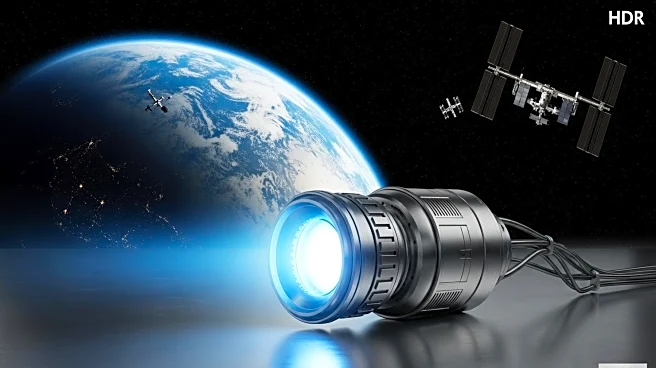What is the story about?
What's Happening?
SpaceX has launched a mission to the International Space Station (ISS) that includes a novel propulsion system designed to maintain the station's orbit. This marks SpaceX's 33rd cargo delivery to the ISS, where the Dragon spacecraft carried essential supplies and scientific experiments. Historically, the Russian space agency has been responsible for reboosting the ISS using their Progress cargo vehicles. However, SpaceX's Dragon spacecraft now features additional Draco thrusters strategically mounted inside its trunk section to counteract the gradual decay of the ISS's altitude due to the thin atmospheric presence at its orbit. This development signifies a shift in the role of commercial companies in space operations, diversifying the means available to ensure the station's continued operation.
Why It's Important?
The introduction of SpaceX's new propulsion system is significant for the future of space exploration and station maintenance. By equipping the Dragon spacecraft with reboost capabilities, SpaceX is setting a precedent for commercial involvement in orbital operations. This advancement supports the ISS's ongoing mission and paves the way for future projects, including a larger-scale version planned for the US Deorbit Vehicle, which will eventually decommission the ISS in the early 2030s. The collaboration between NASA and private companies like SpaceX and Northrop Grumman represents a new era in space exploration, leveraging commercial expertise to enhance scientific research and exploration goals.
What's Next?
SpaceX's continued innovation in space technology is evident in its plans for future Dragon missions. The ability to customize the spacecraft's trunk to accommodate either reboost kits or scientific payloads highlights the flexibility and adaptability of the company's approach. As space missions become increasingly complex, the integration of commercial capabilities will be crucial to sustaining human presence in space. The partnership with SpaceX has been instrumental in enhancing the capabilities of the Dragon spacecraft, enabling it to play a vital role in the ISS's maintenance.
Beyond the Headlines
The success of SpaceX's current mission raises questions about the future of space exploration. With the successful integration of commercial capabilities into orbital operations, this could influence the development of future technologies and the exploration of more distant frontiers. The role of private companies in shaping the future of space travel becomes increasingly significant as we look to the stars.

















